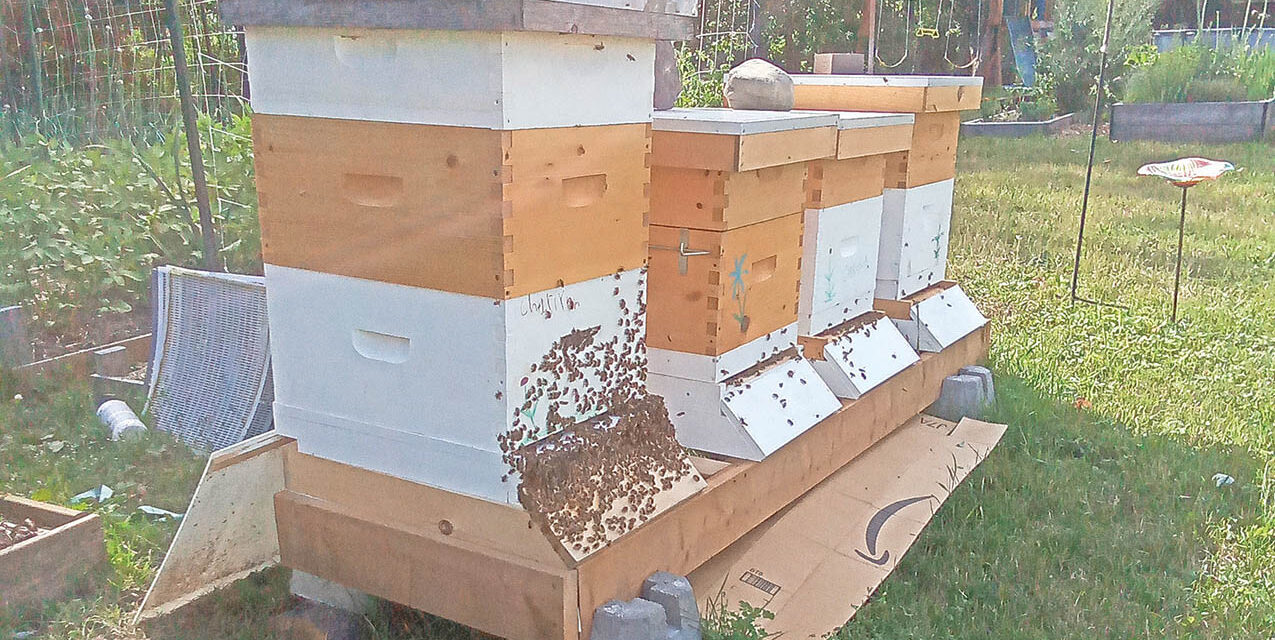Throughout the rural areas there are many hives such as this one, owned by Johnson. Driving by in the winter months, one may imagine bees blissfully sleeping after a busy season of pollen collection and honey production. Johnson explained how bees don’t sleep over the winter, but rather “go into a winter cluster in their hive and vibrate their wing muscles to generate heat.” Courtesy Photo
WINCHESTER SPRINGS – It is not an uncommon sight during the spring, summer and fall months to see bees buzzing around flowering plants in search of the sweet nectar from which they make honey. While honey is known for its use as a natural sweetener, it is also reputed to have medicinal properties as well.
In the small Dundas community of Winchester Springs, Scott Johnson operates Winchester Springs Apiary producing honey and other products utilizing material from beehives.
After spending several years enjoying beekeeping as a hobby, in 2021 he expanded his business becoming a full-time apiarist. “It’s hard work at times but being the person that takes care of the bees all the way to having conversations with customers about bees and honey is very rewarding,” said Johnson.
He currently has 42 hives located in Heckston, Williamsburg and outside of Ingleside. “It’s hard to find locations with good, varied forage for the bees with large monoculture farms. They will fly up to 5km from the hive for good nectar sources,” explained Johnson.
“Bees are struggling because of loss of good habitat, they do best with a varied habitat that offers different sources for nectar and pollen,” explained Johnson. “Bees are under increased pressure from pests such as the varoa mite that can kill a hive unless they are tested and treated regularly. There has been good progress on research on new treatments and breeding stock that are more resistant, but there’s a way to go yet.”
The process of producing honey for sale involves pulling the capped honey frames from the hive and uncapping the cells. The cells are then spun in an extractor, filtered, and bottled for sale. Johnson mentioned “not exposing the honey to heat really preserves the unique flavours you can get from each hive.” Experts in the field suggest there are over 300 different honey varieties varying in flavour, colour, and odor.
When entering the beekeeping field, Johnson suggests starting small and slowing expanding the business. “Starting out as a hobbyist, you buy your first bees. However, if you want to have more hives or pursue beekeeping full-time, it’s not the best idea to go out and buy a couple hundred hives. Grow naturally and raise your own bees using their own nature to expand.” He continued how this will allow the beekeeper the opportunity to develop expertise and develop markets for the product.
Some of the challenges he has faced in developing his business include finding locations for the bee hives and “people that are willing to work with you,” as well as introducing people to local honey, commenting how “once they do taste the difference, the product speaks for itself.” He mentioned it is sometimes difficult to find retail locations to sell the honey, but noted local grocers carry his product and the area has farmers’ markets and fairs which provide an opportunity to sell his honey.
Running an apiary is not an easy undertaking, with Johnson mentioning how the apiarist is at the mercy of weather conditions and pests. He continued that it becomes all worthwhile when seeing a person “try your honey for the first time and love it … it’s worth it.”
If you would like to have a light shined on your business, please contact us at: editor@etceterapublications.ca or call us at 613-448-2321.

Carolyn Thompson Goddard, grew up in Chesterville and attended North Dundas District High School. After completing her BA in Political Science at Carleton University she has worked as a medical secretary and library technician. In 2020 she graduated from Algonquin College with a diploma in Journalism and has been a reporter and column writer for The Chesterville Record for over 10 years.









